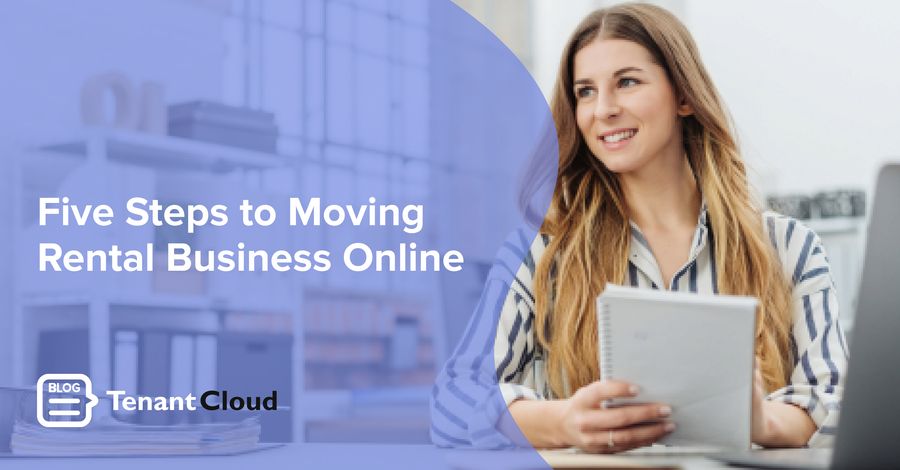Many companies are adjusting their businesses to the new normal by switching to digital alternatives. While the hospitality industry is struggling to deal with the economic downturn caused by the coronavirus outbreak, property management has the potential to get through the lockdown with minimum financial losses.
Luckily, federal assistance makes it possible for some tenants to still pay rent, so investing in affordable long-term rentals remains an appealing idea. However, high-end residential properties are unlikely to be in strong demand because of the current crisis.
For landlords and property owners, one of the most crucial decisions to make during the pandemic is to move their rental business online. Going digital doesn’t refer exclusively to online rent payments and applications, but to every stage of the renting process.
Related: The Best Landlord Checklist: Top 20 Things You Should Do in 2020

It takes only 5 steps to fully move your rental business online. Let’s take a look at each of them:
Step 1. Do a little research.
The first step towards transforming your business into a digital model is to understand the reasons why advanced technology should be implemented and how it can benefit your business. Right now, the fundamental reason is obvious: Social distancing makes it impossible to interact as usual. That’s why embracing the change and making the most of it is a smart decision.
Check out landlord discussion forums on BiggerPockets and Reddit to learn more about online property management, and the ways tech tools optimize workflows to increase flexibility. Since it’s a popular topic, you’ll find a lot of useful insight related to real estate.
Step 2. Find an all-in-one property management software system.
How does a property management software system help manage rentals? It’s like a digital property manager who knows your rentals like the back of their hand and is responsible for day-to-day operations. A solid property management system covers all the processes- from accepting a rental application and moving in a tenant to signing lease agreements and conducting rental showings.
When analyzing property management software systems, pay particular attention to the following features:
- Full accounting dashboard and financial reporting.
- Online rent collection options.
- Automatic invoicing.
- Customizable lease agreement templates.
- Maintenance request management.
- Tenant portals for better online communication.
Along with that, you should take a closer look at the pricing and customer support options.
Since 55% of people will look for online reviews and recommendations before purchasing a product or service, you might also require some help with making the final decision. This article contains information about 20 property management software solutions to help you find the right one.
Related: Top 4 Digital Landlord Tools: Property Management Software, Online Rental Applications And Others
Step 3. Encourage your tenants to become tech-savvy.
According to 2019 survey data from Pew Research Center, only 10% of U.S. adults don’t use the internet.
Though the percentage keeps on decreasing with each year, you might still find yourself renting to a few non-tech savvy tenants.
At this point, it’s essential to emphasize the importance of moving everything online. You can also highlight the benefits of using digital tools for the renters, including paying rent online, submitting online maintenance requests, and communicating with the landlord inside the system.
Paying rent online gives your tenants multiple ways to pay (i.e. credit card or debit card) so they can choose what works for them, plus it allows them to view the transaction details and get notified when the funds clear.
Digital maintenance requests help to track the status of a work order, double-check the information, and add additional details without contacting the landlord. It also lets the tenant communicate directly with the service pro who is responsible for the repair.

Step 4. Switch to online payments.
Enabling digital payments is the next step towards moving your rental business online. Digital payment methods are more secure than accepting rent in cash or with paper checks, especially in the time of the coronavirus outbreak.
You’ve got a great variety of online payment options that eliminate the need for in-person interactions with the tenants and allow tenants to pay rent from anywhere. Most online platforms offer multiple methods to collect rent payments so tenants can choose the most convenient option for them. It’s also nice to be able to connect your bank account to the property so the payments related to that property go straight to the assigned bank account. This feature is available when using TenantCloud.
Step 5. Use other digital tools.
- Online lease agreements
Using online leases gives tenants access to the document whenever needed. Plus, it's easy to sign without meeting up in-person.

- Online rental applications
Customizable rental applications allow you to compile a list of questions that will help you better screen applicants and collect application fees online.
Thanks to online screening services, you can conduct thorough background and credit checks with just a few clicks.
When you have an applicant who is interested in your property, you’ll just need to send them a custom application to fill in and then run a quality screening report through one of the online screening services available. By doing so, you optimize the process of interacting with prospective tenants and basically have all the tenant-related information in one place.
Have we missed any other points? Please share your ideas in the comments section below.
Also, you might want to check out the articles related to the topic:
4 Must-Have Digital Tools for DIY Landlords






